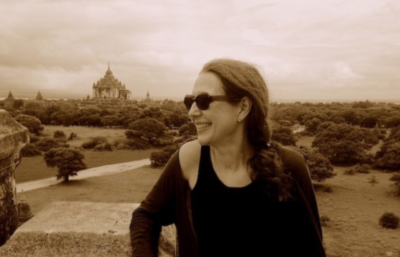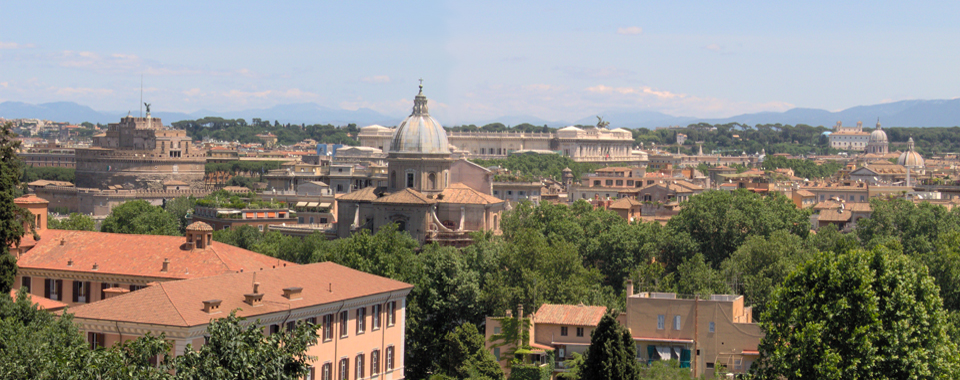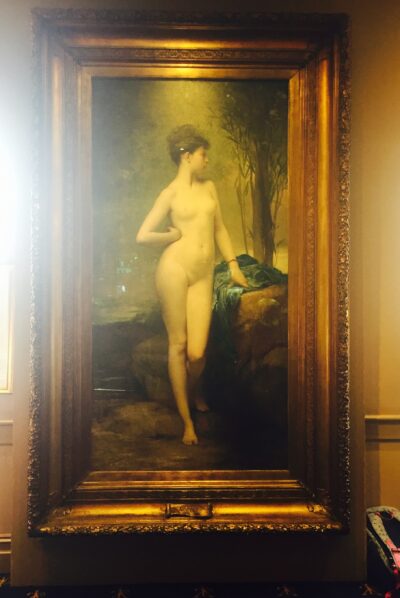
Elizabeth Geoghegan – An American Writer in Rome
Elizabeth Geoghegan was born in New York, grew up in the Midwest, and now lives in Rome. She is the author of the bestselling memoir The Marco Chronicles, Natural Disasters, and the forthcoming collection eightball. Her work has appeared in The Paris Review, The Best Travel Writing, El Pais, Words Without Borders, and elsewhere.
I met Elizabeth because I lingered around Curtin after the AAWP conference so that I could hang out a bit with Sarah. The conference was so big (6 concurrent sessions over three days) I didn’t even know that there were writers from Rome until I met Elizabeth. I caught the bus that Elizabeth was on and if she and her friend did not ask me for directions, I wouldn’t have had the chance to meet her. I took them to Is Donburi on William Street because the food is fresh and it doesn’t take that long to prepare (I’m not that big a fan of their other store since they changed their menu).
If the beginning of this interview seems abrupt, it’s because I already congratulated Elizabeth for getting her short story anthology eightball published. As with all the writers I’ve profiled, this could have been a far longer conversation.
 When is eightball coming out and how long did it take to put this collection together? My first story collection eightball will be out May 1st with Santa Fe Writers Project. It features seven stories and a novella, each one set in a different location –Bangkok, Paris, and Chicago to name a few, and explores the intersection of geography and intimacy. In truth, I never intended to write short stories, and my graduate thesis was a novel, the same novel that brought me to Italy. Circumstances and time constraints prompted me to try my hand at short stories. But to say this book was a long time coming is an understatement. I wrote two of the stories and then took a decade-long hiatus from writing anything at all. The last six stories were produced much more recently, several of them are quite long—“eightball” itself is about 70 pages—so some part of me must still be a novelist trapped in a short story writer’s body.
When is eightball coming out and how long did it take to put this collection together? My first story collection eightball will be out May 1st with Santa Fe Writers Project. It features seven stories and a novella, each one set in a different location –Bangkok, Paris, and Chicago to name a few, and explores the intersection of geography and intimacy. In truth, I never intended to write short stories, and my graduate thesis was a novel, the same novel that brought me to Italy. Circumstances and time constraints prompted me to try my hand at short stories. But to say this book was a long time coming is an understatement. I wrote two of the stories and then took a decade-long hiatus from writing anything at all. The last six stories were produced much more recently, several of them are quite long—“eightball” itself is about 70 pages—so some part of me must still be a novelist trapped in a short story writer’s body.
Thank you for introducing me to Lucia Berlin. I read your essay in The Paris Review and then looked up some of her other works and reviews of her work. I’ve now ordered the book A Manual for Cleaning Women, one that brought her posthumous acclaim. Before you met Lucia, did you have other writing mentors? Emily, I’m so delighted you are reading A Manual for Cleaning Women. I cannot wait to discuss it with you. There isn’t another writer out there like Lucia Berlin. I was so blessed to have her as a mentor and dear friend. I wish she could have been able to finally see me publish. She only got to read those first two of the stories I mentioned, but as it turns out, I got permission to use a quote about my writing from one of her letters on the cover of eightball, which is truly an honor.
Male writers are so often called genius when they write auto-fiction, while women are generally faulted for it.
I never had a writing mentor before Lucia. I came to writing late, enrolling in a graduate program in my 30s. I met Lucia in my first week of classes. When I’d registered for the fiction workshop the instructor was listed as TBA. I asked in the English Department and was told it would be a visiting writer from California. I was nervous that my writing wasn’t up to the level, so I slipped a story and a note in her mailbox asking what she thought. A couple of days later, she called and left an encouraging message on my answering machine, insisting I come to the workshop. Then, during our first class, she mentioned that she needed a lift home. I volunteered to drive her and it turned out that we were neighbours. That ride home sealed the start of the friendship between us. We remained close for the next decade until she died in 2004. 
Do you think you could have written the stories that you have without a mentor? (I’m asking this question because I’m thinking about taking my project into academia so I can get some support). There is no question that having a true mentor is a fortuitous thing for any writer. Of course, there is also no guarantee that academe will afford each student a mentor. Still, the infrastructure of a writing program helps writers create community. My time in grad school helped me build a small, but irreplaceable, network of colleagues who are now lifelong friends, readers of my work, and surely people I would not know otherwise.
What aspects of your writing are influenced by Lucia? Lucia Berlin’s influence is harder for me to pinpoint than you might think, but she helped me give myself permission to both be a writer and to write autobiographical fiction. (Male writers are so often called genius when they write auto-fiction, while women are generally faulted for it. I believe this was one thing that held back Lucia’s career during her lifetime, honestly.) Studying under her also drove home the importance of place in my prose, along with the unmistakable need for authentic detail, and the powerful beauty of a subtle image. She also taught me that technique can never be a substitute for voice. If you don’t get the voice right, the story will fall apart.
Which other writers who have influenced your work? Virginia Woolf, Marguerite Duras, Paul Bowles, Ernest Hemingway, Denis Johnson, and Flannery O’Connor.
I just finished listening to The Marco Chronicles. I only spent a day in Rome back in the early 2000s, and the only men I met were a police chief, a few lower ranked cops and the guy I had arrested —long story but a guy felt me up on a train and thought that he did it because I was the Asian woman he’d seen up close other than ones in his porn collection. The police chief explained that there were different punishments for touching different parts of a woman’s body [not sure if something was lost in translation] but that’s when I realised there were broader issues. Has the #metoo movement hit Italy? Oh, wow … I’ve never been able to listen to the audiobook all the way through because the narrator – although she does an amazing job – sounds so very different from me. It feels weird to hear someone else read your work out loud, don’t you think? As for The Marco Chronicles and its commentary on the inherent machismo of Italian men – first off, it is satire, so somewhat exaggerated, admittedly. 
But I’d say that ogling, a propensity for the wolf whistle, and inappropriate touching (my college students tell me horror stories about riding buses) is still alive and well in this country. The portrayal of women in television doesn’t help. The term scantily clad comes to mind. The term is “velina” (although Italians often substitute “showgirl” preferring their English translation) for a woman who serves as a kind of set decoration, usually on a show where men in suits argue about politics in the foreground. But like most things here, #metoo is probably about 20 years behind the rest of the world. It’s strange though, because the first wave of Italian feminism was wide-swept and truly influential. But provincial attitudes still seem to prevail.
My husband has Italian grandparents and I think we bonded because we grew up in ethnic families when ‘mainstream’ Australians were adjusting to multiculturalism. We sometimes watch the Italian news on SBS and he views it the way I view the Chinese news – picking up only the gist of what’s being said and marvelling at the similar looking but culturally different people are in the ‘motherland’. Do you have diasporic Italian friends or students who’ve gone to Italy to find their cultural roots? Yes. I have a lot of friends who are enticed by tales their grandparents told or by some dream of reconnecting with their Italian roots, whether born American, Australian, or what have you. But I think that Italy has an entrancing quality on most people, regardless of the aforementioned flaws or contradictions. People just can’t help falling in love with this country.
Jhumpa Lahiri’s In Altre Parole is written in Italian, and Italian author Francesca Marciano writes in English. Do you, or do you have plans to, write in Italian? Both Marciano and Lahiri live in my neighbourhood in Rome so I’ve often heard them discuss their choices to write in English or Italian. Although Marciano still writes screenplays in Italian, she lived for many years in Kenya where English was the day to day language she communicated in. When asked about the choice to write her first novel – set in Kenya — in English, she told me that it just flowed more naturally in English since that was the language that connected her to the kinds of people and the place she wanted to portray. After that, she just continued on in English and I’m glad she did. I’m always so impressed when I read her work. The Other Language, her story collection, is brilliant and a favourite of mine. Still, I could never imagine writing about Italy in Italian, even though I have lived a similar experience.
And as far as I can tell, Jhumpa Lahiri’s relationship to Italian doesn’t mirror my own in the least. As I understand it, she fell in love with the language and studied it for many years, perfecting her (spoken) Italian long before she moved to Rome or considered writing in it, which she does so admirably.
I came to Rome with zero Italian; I had studied French but could only read it. At the time, I was writing a novel set in Italy and thought I’d stay in Rome three months. That was 20 years ago! So, I learned my fluent (but imperfect) Italian on the street, never studying it formally. I can say with great assurance that I have no desire whatsoever to write in Italian. I draw the line at writing a WhatsApp message … However, I do think that learning Italian has influenced my writing. When I first started to write, I was a minimalist. Now I think I might be baroque!
I’ve yet to publish a book. What does it feel like to see the final product? Is it quite different from getting an e-book published? Publishing my two e-books was entirely unexpected—the result of an offhanded invite by friends to lunch. It was also a blessing that got me back on track with my writing. I’ll always be grateful to Shebooks for that and I was sad that they weren’t able to sustain the initiative. They helped so many women writers get published.
When I submitted the manuscript for eightball it was through “Submittable,” which is to say into the slush pile. It was eight months before I heard from the publisher. His email came as a complete shock. Now that eightball is almost out, I can say the stakes feel so much higher, I suppose because it is a proper “book” and as such, seen as somehow more legitimate. I’ve loved every minute of working with SFWP and cannot say enough about working with indie and small presses. They’ve been with me every step of the way, sending out galley copies, helping me publish excerpts, and organize readings and events over the next few months. It’s super exciting.
When I look out the window, I can see a stock standard grey fence. What do you see? The view from my attic is of the Janiculum [Gianicolo] hill – a beautiful ridge that presides over Rome and is home to one of Bramante’s famous churches, as well as an ancient Roman aqueduct, both visible in the distance. (As views go, it is tough to lament over this one.)
If I have the opportunity to pass through Rome for a day again, what are some things I must do or some places I must visit? When you get here, you must come over to my place for lunch.

What’s next? I’ve got two projects: one is an experimental nonfiction narrative that intertwines memoir, biography, and the craft of writing. The other is a book containing two novellas in conversation with each other, both set in Rome, each a contemporary retelling of a classic work. Stay tuned!
Elizabeth’s Website: elizabethgeoghegan.com (or elizgeo.com)
FB Page:https://www.facebook.com/elizabeth.geoghegan.9
Istagram:@elizabeth_geoghegan. Twitter: @ElizGeo


2 Comments
Joan geoghegan
Thank you for sharing my daughter’s story. Joan Geoghegan
admin
Thanks for reading the interview! 🙂